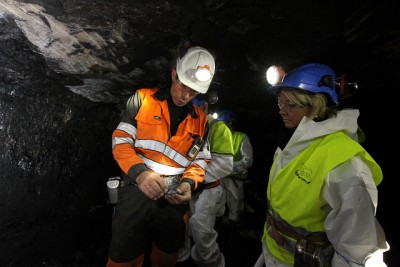An expert commission thinks its perfectly fine for Norway’s huge oil fund to keep investing in coal and other fossil fuels. Environmentalists objected immediately, but the commission argued that the fund can have more influence and control over coal production if it continues to be a major owner in coal companies.

Martin Skancke, leader of the commission, believes coal companies would simply continue to produce coal if the oil fund pulled out of them. Members of the commission, assigned to evaluate how Norway’s giant oil fund should handle its investments in coal and oil, thus recommended on Wednesday that the fund should hang on to them. Skancke believe it’s more important for the fund to have an offensive strategy and exert influence as “a responsible owner.”
Critics, including many Norwegian politicians and environmentalists, believe the fund can have more impact on the coal industry by dumping its shares in coal companies and excluding them from the fund’s portfolio. Asked what he would think if a majority in Parliament nonetheless votes to exclude companies viewed as posing the biggest threats to the environment, Skancke told Norwegian Broadcasting (NRK) he thought that would be “sad.” He maintains that the oil fund has the potential of being “a demanding owner.”
Environmental organizations weren’t buying that argument at all, with Oslo-based Bellona calling the commission’s conclusion “an insult to climate negotiations.” Arild Hermstad, leader of Framtiden i våre hender (The Future in Our Hands), wants the oil fund to “play a leading role in social responsibility” and follow the example of another large Norwegian pension fund, KLP, which recently announced it was pulling out of the coal industry. Hermstad challenged Skancke to produce documentation that could show whether the oil fund has actually had any influence over its coal or other fossil fuel investments. Skancke admitted it was difficult to document any concrete changes as a result of the oil fund’s ownership stakes.
Jeanett Bergan, KLP’s leader for responsible investments, had also hoped the oil fund would be advised to dump its coal investments. “The oil fund is much bigger and has considerably more power than KLP,” Bergan told newspaper Dagens Næringsliv (DN) on Wednesday. “Until know, they haven’t been very good, though, at talking about how they’re using their power or what results they get.”
Risky business
Others have argued that the coal industry, hit hard by declining coal prices and heavy losses, carries too much risk since the oil fund is essentially a pension fund, fed by Norway’s oil revenues that are saved for future generations. Countries all over the world are trying to find alternatives to coal as an energy source, and profit prospects are dim.
Prices of fossil fuels, not least oil, are in decline and therefore present “the biggest risk factors” to the value of the oil fund, according to Re-Define, an international think tank concerned with climate issues. It notes that the oil fund can be hit by a “double whammy,” as the oil revenues that long pumped it up begin to decline, along with the fortunes of its investments in fossil fuels.
Finance Minister Siv Jensen, who was handed the Skancke Commission’s report (external link) on Wednesday, promised to put its conclusions out to hearing quickly, likely before Christmas. Jensen, leader of the conservative Progress Party, has earlier stated that the oil fund should be a professional investor and should not be used to further Norwegian foreign policy or climate policy. That, at least, seemed to put her in conflict with Skancke’s reasons for recommending that coal shares remain in the oil fund’s portfolio.
Others disagree with Jensen, and she and her fellow government ministers face majority opposition in Parliament if the government goes along with the commission’s recommendations. The Labour Party has already called for the oil fund to pull out of coal companies and stands a good chance of gaining support from other parties in Parliament. Labour, paradoxically, has traditionally supported the state’s own ownership of coal mines and production on Svalbard in the Arctic, one of the most fragile environments on the planet and an area hit hard by the climate change for which coal gets much of the blame. Debate looms over the fate of the state’s coal mines as well.
newsinenglish.no/Nina Berglund

